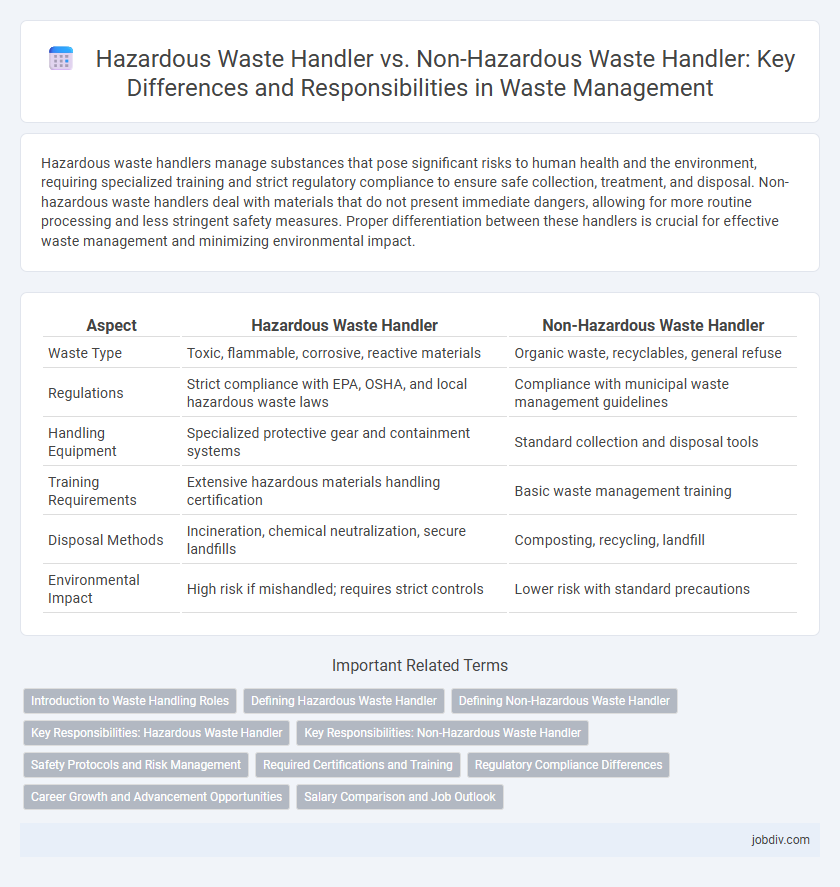Hazardous waste handlers manage substances that pose significant risks to human health and the environment, requiring specialized training and strict regulatory compliance to ensure safe collection, treatment, and disposal. Non-hazardous waste handlers deal with materials that do not present immediate dangers, allowing for more routine processing and less stringent safety measures. Proper differentiation between these handlers is crucial for effective waste management and minimizing environmental impact.
Table of Comparison
| Aspect | Hazardous Waste Handler | Non-Hazardous Waste Handler |
|---|---|---|
| Waste Type | Toxic, flammable, corrosive, reactive materials | Organic waste, recyclables, general refuse |
| Regulations | Strict compliance with EPA, OSHA, and local hazardous waste laws | Compliance with municipal waste management guidelines |
| Handling Equipment | Specialized protective gear and containment systems | Standard collection and disposal tools |
| Training Requirements | Extensive hazardous materials handling certification | Basic waste management training |
| Disposal Methods | Incineration, chemical neutralization, secure landfills | Composting, recycling, landfill |
| Environmental Impact | High risk if mishandled; requires strict controls | Lower risk with standard precautions |
Introduction to Waste Handling Roles
Hazardous waste handlers specialize in managing materials that pose significant risks to human health and the environment, such as chemicals, heavy metals, and biohazards, requiring specialized training and compliance with strict regulatory standards like OSHA and EPA guidelines. Non-hazardous waste handlers deal primarily with everyday refuse such as paper, food waste, and construction debris, focusing on efficient collection, segregation, and disposal without the extensive safety measures required for hazardous materials. Understanding these distinct roles ensures proper waste management, minimizes environmental impact, and protects public health by preventing contamination and accidents.
Defining Hazardous Waste Handler
A Hazardous Waste Handler is an individual or entity responsible for the collection, transportation, treatment, storage, or disposal of hazardous waste, which includes materials that are ignitable, corrosive, reactive, or toxic. They must comply with strict regulations set forth by agencies such as the Environmental Protection Agency (EPA) to ensure proper management and minimize environmental and health risks. Unlike Non-Hazardous Waste Handlers, they require specialized training and certification to handle waste classified as dangerous under laws like the Resource Conservation and Recovery Act (RCRA).
Defining Non-Hazardous Waste Handler
Non-hazardous waste handlers manage waste materials that do not pose significant risks to human health or the environment, such as paper, plastic, food scraps, and garden waste. Their responsibilities include collection, sorting, recycling, and proper disposal of biodegradable and inert waste, ensuring compliance with local environmental regulations. Compared to hazardous waste handlers, who must follow stringent safety protocols for toxic, flammable, or corrosive materials, non-hazardous waste handlers focus on minimizing landfill impact through effective waste segregation and resource recovery efforts.
Key Responsibilities: Hazardous Waste Handler
Hazardous waste handlers are responsible for the safe collection, transport, and disposal of materials classified as dangerous due to toxicity, flammability, or chemical reactivity, ensuring compliance with regulations such as OSHA and EPA guidelines. They perform risk assessments, use specialized protective equipment, and follow strict protocols to prevent contamination and environmental hazards. These professionals also maintain detailed documentation and coordinate emergency response actions in case of spills or exposure incidents.
Key Responsibilities: Non-Hazardous Waste Handler
Non-hazardous waste handlers are responsible for the safe collection, transportation, and disposal of waste materials that do not pose significant health or environmental risks, such as household garbage, recyclables, and organic waste. Their key duties include sorting materials, ensuring compliance with local waste management regulations, and maintaining cleanliness to prevent contamination. Efficient handling of non-hazardous waste supports sustainability efforts and minimizes landfill impact.
Safety Protocols and Risk Management
Hazardous waste handlers adhere to stringent safety protocols, including the use of specialized personal protective equipment (PPE), hazardous material containment, and emergency response plans to mitigate exposure risks. Non-hazardous waste handlers follow standard safety measures but typically face lower levels of risk, requiring less intensive protective gear and simpler risk management procedures. Effective hazard assessment and compliance with regulatory standards are critical for both roles to ensure the health and safety of workers and the environment.
Required Certifications and Training
Hazardous waste handlers must obtain certifications such as OSHA HAZWOPER and complete specialized training in chemical safety, spill response, and hazardous material handling to comply with regulatory standards. Non-hazardous waste handlers typically require general safety training and may obtain certifications like RCRA awareness but do not need extensive hazardous material-specific credentials. Proper certification and training ensure compliance, worker safety, and effective waste management across both categories.
Regulatory Compliance Differences
Hazardous waste handlers must comply with stringent regulations such as the Resource Conservation and Recovery Act (RCRA) to manage toxic, ignitable, corrosive, and reactive materials safely. Non-hazardous waste handlers follow less rigorous guidelines primarily governed by local and municipal standards, as their waste lacks harmful properties requiring specialized treatment. Regulatory compliance for hazardous waste entails detailed record-keeping, proper labeling, transportation restrictions, and disposal methods to minimize environmental and health risks.
Career Growth and Advancement Opportunities
Hazardous waste handlers often experience faster career growth due to specialized training and certifications required for managing toxic substances, leading to roles in safety compliance and environmental management. Non-hazardous waste handlers face more limited advancement opportunities, typically progressing within operational or logistics positions but rarely moving into high-level regulatory or safety roles. Employers value hazardous waste expertise for leadership positions, driving stronger long-term career potential in the environmental and industrial sectors.
Salary Comparison and Job Outlook
Hazardous waste handlers typically earn higher salaries than non-hazardous waste handlers due to the specialized training and safety protocols required, with median annual wages around $45,000 compared to $35,000 for their non-hazardous counterparts. The job outlook for hazardous waste handlers is projected to grow by 4% through 2030, driven by stricter environmental regulations and increased industrial waste management needs, whereas non-hazardous waste handlers face slower growth of about 2%. Employers often seek candidates with certifications in hazardous material handling to mitigate risks, which further influences salary premiums and employment opportunities.
Hazardous Waste Handler vs Non-Hazardous Waste Handler Infographic

 jobdiv.com
jobdiv.com